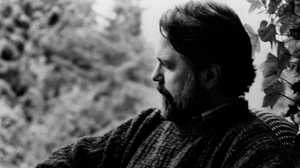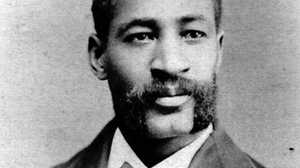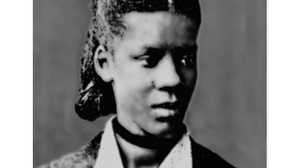George Leonard White

George White's leadership of the Jubilee Singers was the culmination of a career dedicated both to music and to proving African Americans were the social and intellectual equals of whites. Born in Cadiz, New York in 1838, White was the son of a blacksmith who played in a local band. He attended public school until age fourteen and moved to Ohio when he was twenty. Although not a singer himself, White developed a talent for interpreting music and began directing choirs at various schools and churches in Ohio, where he also founded a black Sunday school.
White’s service in the Union army at Gettysburg, Chancellorsville, and Chattanooga nearly destroyed his health. After being medically discharged from the army, he joined the Freedmen’s Bureau in Nashville, a city crowded with impoverished former slaves. When the Fisk Free Colored School opened under the auspices of the American Missionary Association (A.M.A.) in 1866, White volunteered to teach music and penmanship. Recognizing that music had served as an important mode of resistance and consolation during his students’ enslavement, White organized a choir. In 1867 his group performed at Nashville's Masonic Hall, garnering $400 toward the performers' education.
Still only in his 20s, White was hired as Fisk’s treasurer, making him responsible for collecting tuition from newly freed families and keeping the school's creditors at bay. White continued to work with the choir, selecting the best singers from a voice class at Fisk. With the help of sixteen-year-old Ella Sheppard, whom White hired as an assistant in 1868, the choir performed all over Tennessee, giving shows that combined drama, recitations, gymnastics, piano and singing.
Though White contributed his own meager savings toward Fisk's upkeep, by the autumn of 1871 the school was deep in debt. White proposed taking the best of his singers on a fundraising tour of the North, but the A.M.A. and Fisk's new president Adam Spence opposed the idea as vulgar, risky, and born out of White's own self-interested opportunism. White's singers believed in him, however, and on October 6, 1871, White departed from Nashville with his troupe of singers "to sing the money out of the hearts and pockets of the people."
The troupe had planned to stick mainly to popular songs but soon began to receive excited praise for the few spirituals they sang as encores. Many African Americans were uneasy with the performance of sacred music for the amusement of white audiences. Nevertheless, White collected as many spirituals as he could, calling upon his own singers to teach him the music their parents and grandparents had sung as slaves. Soon the singers became known for these songs, and White's naming of the group after the biblical year of Jubilee helped secure their role as unofficial representatives of the black religious experience to white audiences.
In April 1873 the singers embarked on a fundraising tour of Britain. Though they were extremely well received, delighting such luminaries as Queen Victoria and Prime Minister William Gladstone, their rigorous rehearsal and performance schedule, combined with three years of accumulated fatigue from traveling, began to take a heavy toll. After his wife died of typhoid fever within a year of the troupe’s arrival in Britain, a grief-stricken White collapsed due to hemorrhaging in his lungs. The singers continued performing under the direction of Ella Sheppard, but the thrill of success would continue to be tempered by the physical and emotional stress of touring.
With a few of the original singers and several new members, White embarked on a second European tour in the spring of 1875. The British, now familiar with the singers, heartily welcomed their return. Revival meetings where the Jubilee Singers were scheduled to perform frequently drew audiences of over ten thousand. When White took the singers to Holland the following year, he expected less enthusiasm since non-English speaking audiences would not understand the group's lyrics; nevertheless, the singers were mobbed by admirers. Unfortunately, White’s health continued to decline and after the group returned to England, Fisk’s president Erastus Cravath took over. Ignoring White’s pleas to let the troupe rest -- several were sick and all were exhausted -- Cravath took them all over Germany, where they again experienced huge success. But by now the singers had had enough of the relentless touring, their managers, and each other and after a series of trying incidents -- one of the singers had a stroke, another repeatedly collapsed, several became resistant to White’s paternalistic attempts to keep order, and Cravath refused to raise any of their salaries -- White quit in disgust. He sailed home in May 1878. Two months later the troupe disbanded.
With singer Frederick Loudin, who had joined the group for its second European tour, White formed a new choir of Jubilee Singers in 1879. Under Loudin, the group toured Asia, Australia, and the American West in the 1880s. White, despite rheumatism and an injury sustained in a fall from a stage in 1881, continued to work with the singers on and off until his death from tuberculosis in 1895. His memorial service at Fisk was attended by several of the original Jubilee Singers. They sang the spiritual "Steal Away," a longtime favorite of White’s, in his honor.







